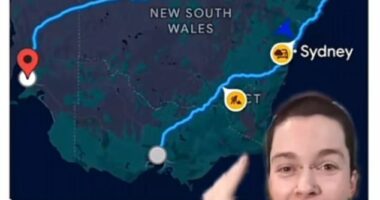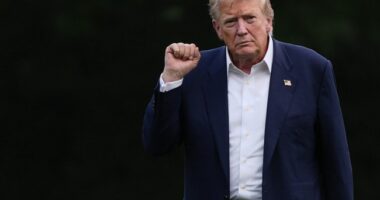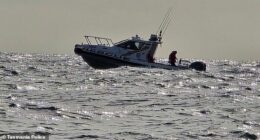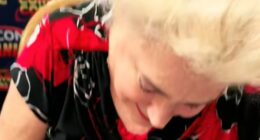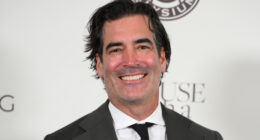A major TV network’s practice of displaying a weather map with Indigenous names for cities has sparked a heated debate.
On SBS’s flagship World News Bulletin, the Australian weather map is shown first with the English names for each capital before flipping over to Indigenous titles.
Sydney becomes Warrang, Brisbane is known as Meanjin, Melbourne is Naarm, Adelaide is Tarndanya and Perth is Boorloo.
Perplexed 2GB listener Peter rang Ben Fordham’s show on Wednesday morning to complain that the Indigenous names would not mean anything to the vast majority of viewers.
Indigenous leader Warren Mundine told Daily Mail Australia on Wednesday that he likes the idea of Indigenous place names but not everything has be renamed.
‘It’s like the idea of Welcome to Country. People think it is a nice thing but now you have to do it before meetings, before conferences, before you give a speech, on an aeroplane,’ Mr Mundine said.
‘People are using it for their own political agenda, rather than getting up and saying “welcome to my country, we’re glad to have you here”, they are saying you came here to pillage and rape so bugger off, so it is cheesing people off.’

SBS World News has been displaying Indigenous names for Australian capitals on its weather maps since February, 2023
He admitted when used on airport information boards Indigenous names could be confusing, even to him.
‘I was at the airport the other day and I was trying to find what flight I was on and the names are popping up all over the place and I didn’t have a clue what they were,’ Mr Mundine said.
‘If I am having a problem the general public would having a problem and being annoyed at this stuff.’
Mr Mundine believed that the Australians were tired of being told they were racist and that everything about Australia had brought misery to Indigenous people.
‘When you look around most Aboriginals are doing OK. They are getting into the universities and becoming doctors and lawyers and doing quite well,’ he said.
‘We haven’t done anything wrong. We are the generation who got rid of the race laws and got full voting and citizen rights. We are the people who raise millions every year that goes into Aboriginal education so why are we being abused?’
‘It is only in the remote areas they are struggling but that is because of economic issues and crime that we have to deal with.
‘There’s too much crime in Aboriginal communities, so let’s change the name of Brisbane. How does it help?’
He also said the areas covered by Australia’s bigger cities often had a number of tribes living in the vicinity so it could be contentious when one name was picked over another.
‘It’s a total mess and rather than making the country better it’s just making people angry,’ he said.
Those responding to the 2GB radio segment on the station’s Instagram page were strongly polarised over the use of Indigenous names.
‘Token silliness,’ one personal called it.
‘What are they trying to prove by shoving that down our throat? Virtue signalling at its finest,’ wrote another commenter.
‘Imagine the poor international tourists,’ another person wrote.
However, there were a number who liked the idea.
‘I love this… the languages of the lands are so diverse,’ one person wrote.

Indigenous leader Warren Mundine said the Aboriginal names for capitals displayed at an airport once almost made him miss a flight
‘It’s pretty cool, Educational too. I like it,’ said another.
Some fired back at those unhappy with the retitled maps.
‘It seems the only ones that are mad and complaining are those that listen to 2GB and watch Sky News,’ one person wrote.
‘So yeah, conservatives are the only ones triggered.’
SBS has been displaying Indigenous names for Australian capitals since February, 2023.
In introducing the move the publicly funded broadcaster said it was to reflect ‘Traditional Custodianship and more than 60,000 years of history’.
In introducing the practice SBS Elder-in-Residence and Widjabul Wia-bal woman Rhoda Roberts AO said the ‘revitalisation of First Nations’ languages heals our nation’.
‘For me, it’s a time of a new awakening that informs us all,’ she said.
‘Behind every word you will find information about the seasons, the place and the ecology of our wonderful country. It’s more than education – it’s also the science and the realisation that words can enlighten us all.’
SBS Director of News and Current Affairs Mandi Wicks said at the time that the network ‘was proud to be taking this important step in First Nations representation in Australian media’.
‘The power of language to foster inclusion can’t be understated, and this initiative will further share First Nations languages and cultures with all Australians,’ she said.


